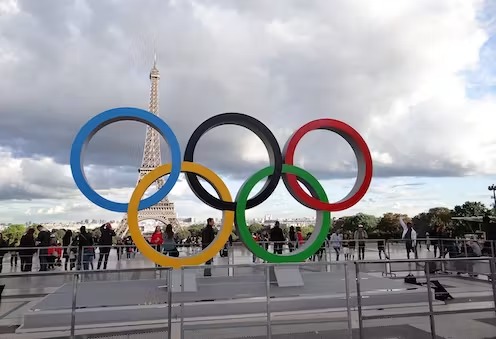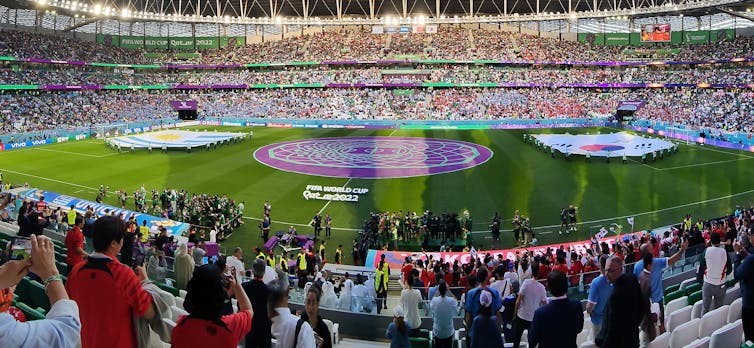Mega-events such as the Coachella Music Festival, the pilgrimages to Mecca and the World Cup have become increasingly prominent in contemporary times, yet we often neglect to consider the environmental impact of bringing tens of thousands and sometimes millions of people together.
This is perhaps because when we think about environmental sustainability, we tend to weigh up how individuals, households, or even industries might be polluting the planet. However, mega-events are striking examples of the complex phenomenon of sustainability, mostly due to the impact of collective behaviour on the environment. The proof is that when a large gathering ends and everyone goes back to their ordinary lives, they almost invariably leave behind an alarming trail of accumulated waste. Even more troubling is the fact that such events have other negative environmental impacts that aren’t even visible to the eye.
A telling example is the Qatar 2022 World Cup. Host cities and organisations typically look to draw attention on the intended positive outcomes, including economic benefits and fan satisfaction. However, the Qatar event was dogged by a wide range of environmental and social controversies. These included the construction of gigantic stadiums in the middle of the desert, the abusive and often deadly working conditions for those constructing the facilities, the air conditioning needed to cool the audience in the country’s extreme temperatures, and the hundreds of international flights taken by more than a million spectators to travel to Qatar.
The challenges of the Paris Olympic and Paralympic Games
As problematic as the Qatar World Cup was, organising the Olympic Games is perhaps even more challenging. On 26 July 2024, Paris and other cities in France will welcome the Olympics. As the event is around the corner, times are ripe for the development of sustainable solutions.
Even without the Olympics, Paris holds the title of the most-visited city in the world, bringing with it many sustainability-related challenges. Congested boulevards, air and noise pollution, and waste generation are definitely part of what is know as the “Paris syndrome” faced by many first-time visitors. These issues reveal that the vast number of visitors that the city already receives – more than 50 million tourists in 2019 – is unsustainable.
The Olympic Games will boost these numbers even higher. The estimate is that at least 600,000 spectators – the equivalent of the capacity of 10 stadiums – will be able to take part in the opening ceremony, which will take place along 6km of the River Seine’s banks. The question then becomes, how can the Olympic Games in Paris be more sustainable?
The “sustainable games” plan
Judging from its official website, Paris 2024 is committed to holding sustainable games while making progress on issues such as the environment, employment, the economy, and education. Such ambitions are inherently paradoxical, in that they can create socio-economic value even while destroying environmental value.
To lighten the games’ carbon footprint, the organising committee has promised a trailblazing project that will be consistent with the 2015 Paris Agreement on climate change and the Olympic Agenda 2020+5. The organisers are also working in partnership with WWF France.
Basing themselves on a new model, organisers hope to halve the games’ carbon emissions compared to previous editions while offsetting more than what was generated. Thus not only have they pledged to offset an estimated budget of CO2 emissions after the event is over – a standard procedure – they will begin even before it has started.
Yet, the plan provides few specifics such as dates or further operational details, with some decisions still in the process of being taken. To achieve this goal, Paris 2024 is applying what is called the ARO approach, which is an abbreviation to avoid, reduce and offset. Using this model, the mega-event intends to:
-
avoid emissions by using existing or temporary infrastructures for 95% of events.
-
reduce emissions by using renewable energy, banning single-use plastic and sustainable catering). The overall target for total emissions is 1,5 million tons of CO2, which is way lower than previous editions of the Games, such as Rio (3,6 million tons) and London (3,3 million tons).
-
offset 100% of residual emissions linked to the games, including indirect ones such as travel by spectators.
Paris 2024 intends to advance the topic of environmental transition among those involved through an app called Climate Coach for Events. It will serve to inform employees and participants and help them measure and slash their personal and professional carbon footprint. The toolkit is planned to remain available for future sports events.
The initiatives, designed by a dedicated committee of nine experts and government representatives, are extensively explained in a report.
From plan to reality
Although the sustainability plan is innovative, ambitious, and promising, greenwashing has been seen in other recent mega-events. The organisers of the Qatar World Cup pledged that it would be carbon-neutral, yet it ended up being described as a “climate catastrophe” and produced as much as five times more emissions than earlier cups.
Organisers of the 2022 Qatar World Cup pledged that it would be ‘carbon neutral’, but the simple fact of holding a mega-event in a desert made such promises difficult to keep. Here, spectators watch Korea play Uruguay at Education City Stadium on 24 November 2022. Heo Manjin/Wikipedia, CC BY
Taking the longer view, a study published in Nature found that the overall sustainability of summer and winter Olympic Games since 1992 is medium and has declined over time. Expectations are not facts until the Paris Olympic Games are over, of course, and to this date, most of the activities are nothing but plans. Needless to say, my hopes are that the event can turn predictions into watershed realities, ultimately serving as a benchmark for other mega-events.
Building on some interpretations from my current research on the environmental impact of mega-events, I visualise a key source of obstacles and a crucial opportunity for the success of the games’ sustainable plans. When it comes to hindrances, managing a large ecosystem of stakeholders with contrasting objectives could be one of the main challenges of the Paris 2024 games. Its ecosystem consists of 17 primary stakeholders, including public and private entities as well as NGOs, such as the Paris city council, businesses and corporate sponsors, and the French National Olympic and Sports Committee. All will need to be aligned with the games’ sustainability-driven ideas.
The mega-event gives us a unique chance to trumpet sustainability. According to the organisers, 13 million tickets are expected to be sold and 4 billion television viewers should watch the event. This is no small opportunity for educating viewers, whether they’re physically present or watching remotely.



 From Messi to Mika Häkkinen: how top athletes can slow down time
From Messi to Mika Häkkinen: how top athletes can slow down time  How did sport become so popular? The ancient history of a modern obsession
How did sport become so popular? The ancient history of a modern obsession  Why the Australian Open’s online tennis coverage looks like a Wii sports game
Why the Australian Open’s online tennis coverage looks like a Wii sports game  JD Vance to Lead U.S. Presidential Delegation at Milano Cortina Winter Olympics Opening Ceremony
JD Vance to Lead U.S. Presidential Delegation at Milano Cortina Winter Olympics Opening Ceremony  Trump Urges Hall of Fame Induction for Roger Clemens Amid Renewed Debate
Trump Urges Hall of Fame Induction for Roger Clemens Amid Renewed Debate  Trump Plans UFC Event at White House for America’s 250th Anniversary
Trump Plans UFC Event at White House for America’s 250th Anniversary  Champions League final 2025: a battle for glory against a backdrop of money and fashion
Champions League final 2025: a battle for glory against a backdrop of money and fashion  Trump’s U.S. Open Visit Delays Final, Fans Face Long Security Lines
Trump’s U.S. Open Visit Delays Final, Fans Face Long Security Lines  Apple Eyes U.S. Formula 1 Broadcast Rights in Major Sports Streaming Push
Apple Eyes U.S. Formula 1 Broadcast Rights in Major Sports Streaming Push  Trump Booed at Club World Cup Final, Praises Pele as Soccer’s GOAT
Trump Booed at Club World Cup Final, Praises Pele as Soccer’s GOAT  NBA Returns to China with Alibaba Partnership and Historic Macau Games
NBA Returns to China with Alibaba Partnership and Historic Macau Games  US Reviewing Visa Denial for Venezuelan Little League Team Barred from World Series
US Reviewing Visa Denial for Venezuelan Little League Team Barred from World Series  Trump's Transgender Sports Ban Faces Enforcement Challenges
Trump's Transgender Sports Ban Faces Enforcement Challenges  Extreme heat, flooding, wildfires – Colorado’s formerly incarcerated people on the hazards they faced behind bars
Extreme heat, flooding, wildfires – Colorado’s formerly incarcerated people on the hazards they faced behind bars  Los Angeles Mayor Says White House Must Reassure Fans Ahead of FIFA World Cup
Los Angeles Mayor Says White House Must Reassure Fans Ahead of FIFA World Cup 

































